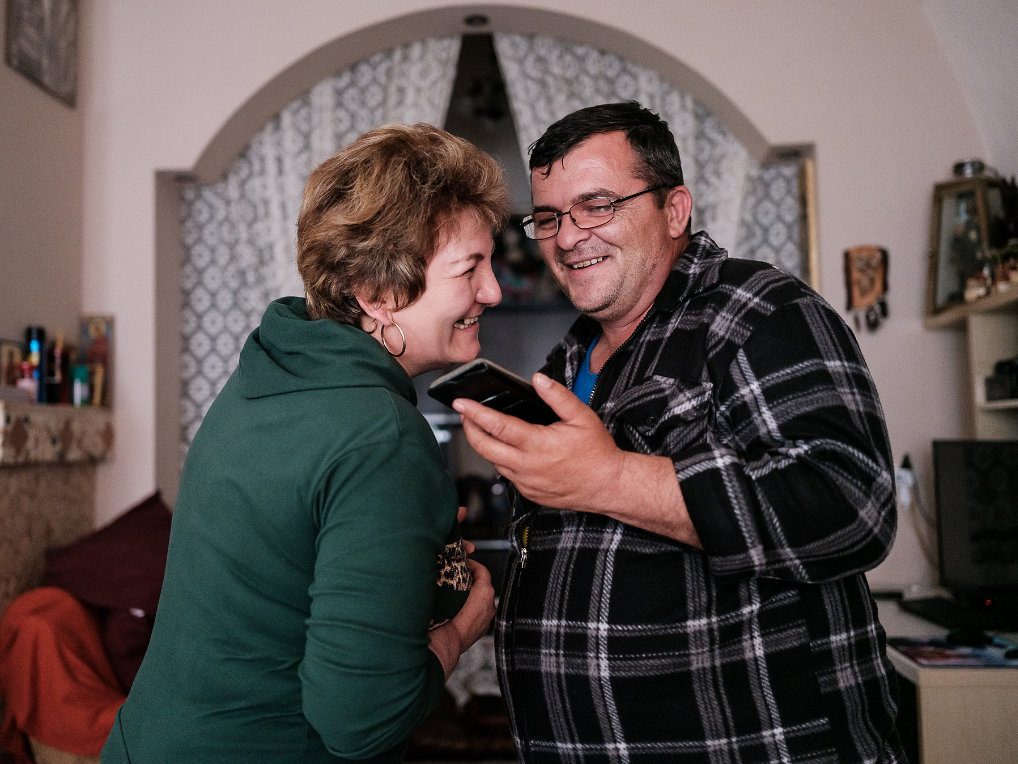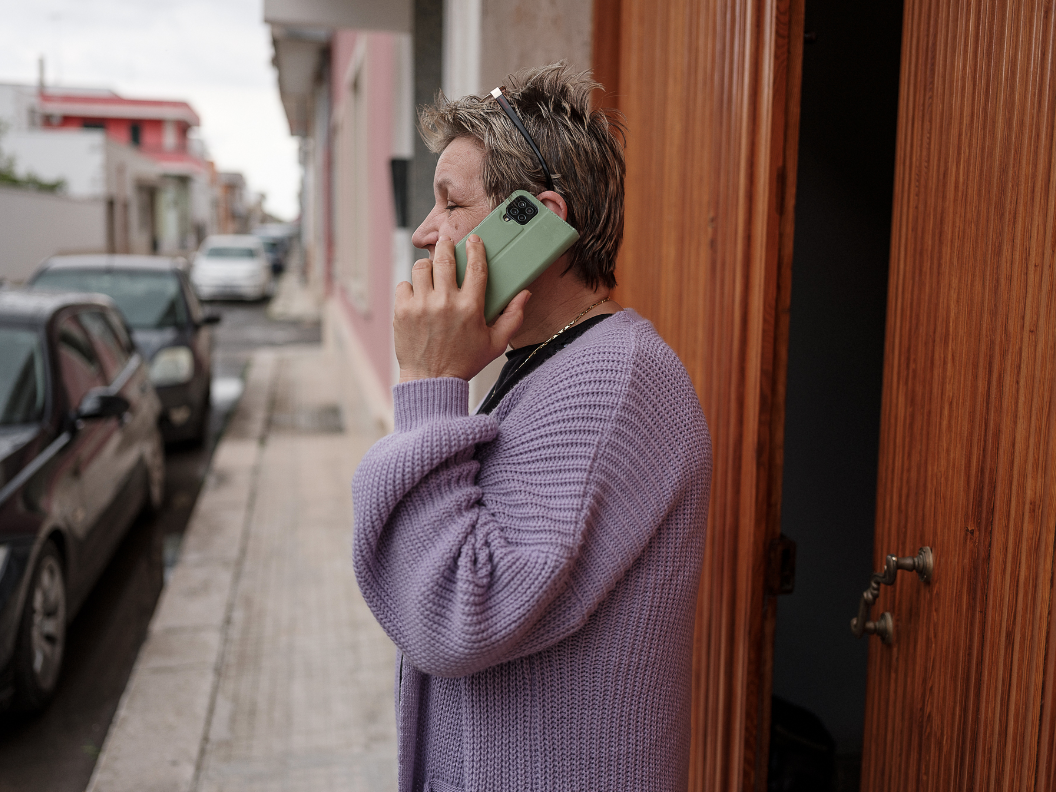Try to imagine what it’s like to live the life of someone who is old and sick before you are old and sick yourself. Giving up your own identity and adapting to the rhythms of their lives. Getting up in the morning when they wake up, washing them, making them breakfast, keeping them company 24 hours a day.
Cooking, playing cards when asked, cleaning the house, sometimes being criticised by them and their family, watching the TV programmes they want to watch, getting them ready for bed, going to bed at the same time as them, waking up at night when they need you or call out because of hallucinations – some patients have dementia or Alzheimer’s. […] You only have two hours off, but not every day and only if you’re lucky that the Italian family that employs you will at least respect that one right you have.
Every day you live in the house of strangers, some of whom treat you kindly and some of whom don’t. Some count the biscuits you eat and ask you why you use so much coffee; others leave you in the cold in winter, ask you to do the laundry by hand and treat you like a servant for the whole family, even though this was not your original agreement.
In Italy, you may be doing undeclared or semi-declared work, either without a contract or with one that says you work five or six hours a day, but you work around the clock. Of course, 24/7 work is illegal in Italy, but families don’t want or can’t afford to pay more taxes or hire two badanti* if necessary.
You accept all this because you are forced by the debt and poverty back in Romania. You need this job, and the family you left behind needs the money you earn. Your pension will be small, so you face an old age without a safety net. You can only hope that your sacrifice will not be forgotten by the children you helped. […]
In the spring [of 2022, ed.] I spent a few weeks in the southern Italian region of Apulia, where I met several Romanian women who work as badanti. I spoke to them in the parks of the small towns in the province of Lecce, where they go during the two hours off work they are supposed to have every day, but don’t always get.
The reasons why they left the country have been known for years and have to do with everyday life in Romania: unemployment, poverty, marginalisation of the weak. Many Romanian women sacrificed themselves for their families when their husbands lost their jobs following the closure of factories or mines. Some are single mothers who have had to leave their children to afford to raise them. Others were left without a job when textile workshops or various factories in Romania closed down.

This article is a Nominee of the European Press Prize 2023. The republishing of this piece was kindly granted by the European Press Prize. Visit europeanpressprize.com for the longer version of this article in English. This article was originally published in Romanian for Libertatea. Translation by Voxeurop.

Neviano, Apulia, May 2022. Ionela and Bogdan Potcovariu talking on the phone with an Italian friend. | Photo: ©Cosmin Bumbuț
Violence against women in Romania
During the weeks I spent in Apulia, I discovered a phenomenon that should have worried us years ago, when a whole wave of Romanian women first left to look after the elderly in Italy: many of them were fleeing violence at the hands of their husbands. In the absence of programmes for survivors of domestic violence and women’s shelters, migration was their solution to save their lives.
After I published one of my articles on badanti on our Facebook page, Teleleu, it gathered hundreds of comments, most of them from Romanian women looking after elderly people in Italy. Many of them said they had fled the country because of domestic violence, but I was particularly struck by this comment:
“If it wasn’t for Italy, I would have found another small place in the world to hide from an abuser who, instead of rebuilding his life, is still looking for me to kill me because I ran away from him. I chose to live for my four children, even if it meant running away and doing honest work in this hard world, rebuilding my life with someone else, because I wanted my children to be proud and happy. And today I am happy with my decision. If I had stayed in my country, I’d have died long ago.” […]
The failure of the Romanian state to build shelters, improve legislation and implement programmes to support survivors of domestic violence has led to migration in recent decades.
Migration is a consequence of Romania’s social problems, and when politicians talk about this phenomenon, they should also talk about solutions for survivors of domestic violence. In 2020, 26,809 cases of domestic violence were reported and 72 people were killed as a result, most of them women and children.
There is a direct link between migration and domestic violence, teenage motherhood, racism, corruption, unemployment, the failure of health and education systems, as I have written before.
The number of Romanians living abroad is enormous: in Italy alone there are now 156,855 Romanian badante. The real number could be twice as high, as DOMINA, an association for families, estimates that 57% of them work illegally. On 1 January 2021 there will be 1,076,412 Romanians living in Italy. […]
Ileana often kept as little as 10 euros for herself in case she fell ill and needed medicine. She worked illegally, without a contract, because when you need money and don’t want to go home to your violent husband, you take anything.
She was humiliated, insulted and left out in the cold by the Italian families she worked for. She was treated like a servant and lost years of her life in exchange for the over 100,000 euros she sent to her family in Romania during her 16 years working in Italy.

Leverano, Lecce province, May 2022. Eugenia, 54, in front of the house. She cares for a 94-year-old woman. | Photo: ©Cosmin Bumbuț
Like being under house arrest
Now Ileana has nothing. Her husband won’t let her return to the house he renovated with the money she earned in Italy. She has no legal recourse against him because the land under their house and the one they built for their children belongs to him as an inheritance from his parents. She wouldn’t dare take him to court anyway, for fear of her violent husband.
She has no savings, having sent home almost all her earnings, and retirement does not look like an option, as Ileana will have no pension, having worked without a contract for most of her life.. […]
She is not the only one in this situation, and the Romanian state is not ready for her return. Dozens of thousands of Romanian women, now badante in Italy, will return to the country in their old age. Some will return to their violent husbands because they have nowhere else to go. The sacrifice they make goes so far that, as Ionela reports, some Romanian women even find extra work cleaning during the two hours off: “Working as a badante is like being under house arrest,” commented a Romanian woman on our Facebook page.
Vulnerability begins in Romania
Romanian women are used to making such sacrifices because that is what society expects of them. And the destiny of a badante involves sacrifice, because living 15, 16, 20 years of the life of elderly sick people, whom you take care of day after day until they die, is not a life.
When discussing the rights of Romanian badante and the abuse they suffer, some voices continue to blame the victims: Why do they accept to work in these conditions? Why don’t they demand their rights?
Their vulnerability begins in Romania, the first country where their rights aren’t respected. Romanians put up with abuse abroad because no one in their own country has taught them that they have rights.
Many of the women were already poorly paid and exploited in Romania. Eugenia worked in a bread factory in Tulcea, where she broke her leg carrying a box of products down a flight of stairs. Although she still has a limp, the factory never paid her compensation.
Marcela grew up in a community in Curtea de Argeș where many women were beaten by their husbands, as she was. There are 30 families on Marcela’s street, and 10 women there have left to work abroad. For many Romanian women, Italy was a way out, because the Romanian state never held out a helping hand in the form of proximity bracelets for aggressors or sufficient beds in shelters.
Having always been on their own, these women don’t know how to ask for help from institutions when they are sexually abused. They are afraid because in Romania domestic violence has crushed their courage. […]
The stories are heartbreaking: single mothers, abused women, a widow who lost her job when the tailor who employed her closed down, a young woman who remembers that when she was 14, her mother went to Italy to work and she felt abandoned.
You can’t talk about migration without talking about all the social problems that cause it. You can’t cut out a piece of Romanian reality and ignore the whole context around it. […]
Silvia Dumitrache, founder of Donne Romene in Italia, an association that defends the rights of Romanian workers, says that both the Romanian and Italian states benefit from the sacrifices of the badante: the Romanian economy grows with the money they send home, while Italy saves on expenses.
According to the DOMINA report, the total cost of care for the elderly paid for by families is 11.6 billion euros – which the Italian state saves by no longer paying for this care through its public assistance service.
In addition, the Italian state benefits from the taxes paid by the families who sign employment contracts with their badante. Silvia Dumitrache says that the institutions turn a blind eye to the round-the-clock work of many badante and the violations of their rights: “The Italian state is an accomplice in this situation.”
Mirela Videa, labour and social affairs attaché at the Romanian embassy in Italy, believes that the Italian state should implement two solutions: tax rebates for families caring for elderly members, and the creation of an institution to manage “the confluence between demand and supply”, allocating jobs and eliminating black market brokers who exploit workers.
Silvia Dumitrache says that Romania has a responsibility to inform Romanian workers, who should know their rights when they go to work abroad.
During my interviews with Romanian badanti, I received two recurring answers to the question “Why did you come to work in Italy? Many women told me that they had debts from buying household appliances or from loans taken out when a family member died unexpectedly and they couldn’t afford the funeral.
Migration is only a slice of the Romanian reality, where women are forced to leave their children behind to pay the instalments on the washing machine. […]
*I have decided to use the term badante in this text; it became commonplace in Romania in the early 2000s, when căpșunari (strawberry pickers) and badante (live-in carers) were the most important waves of migrations in our country yet. I find its social and cultural semantics crucial for the story of the Romanian diaspora. In Italy, the word badante is still used informally, though in public communication terms like “domestic worker” or “family assistant” are preferred.
This article was shortlisted for a European Press Prize in 2023 in the Migration Journalism Award category. It was originally published in Romanian in Libertatea and Teleleu.eu. Translated by Voxeurop and syndicated by Voxeurop Services.









